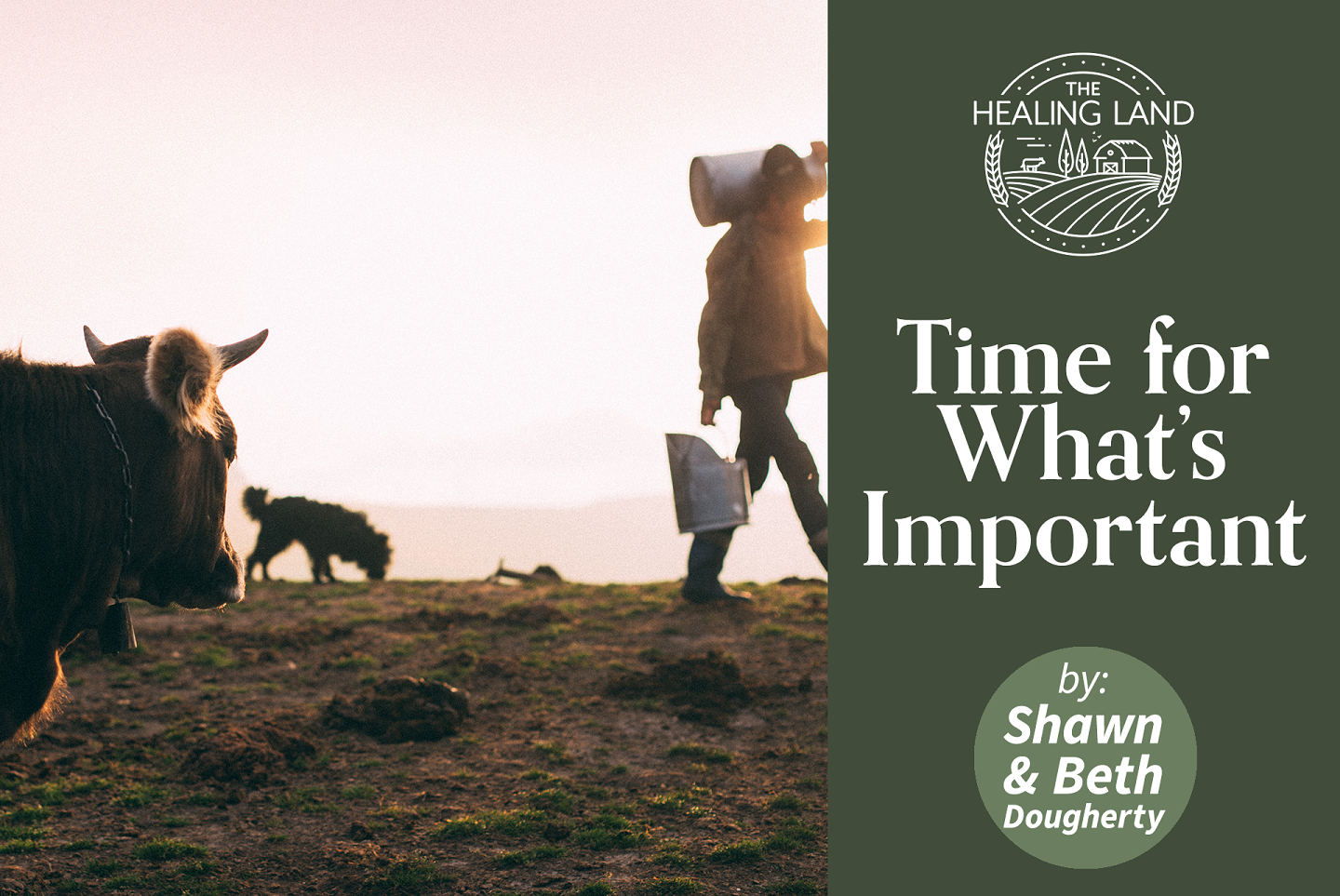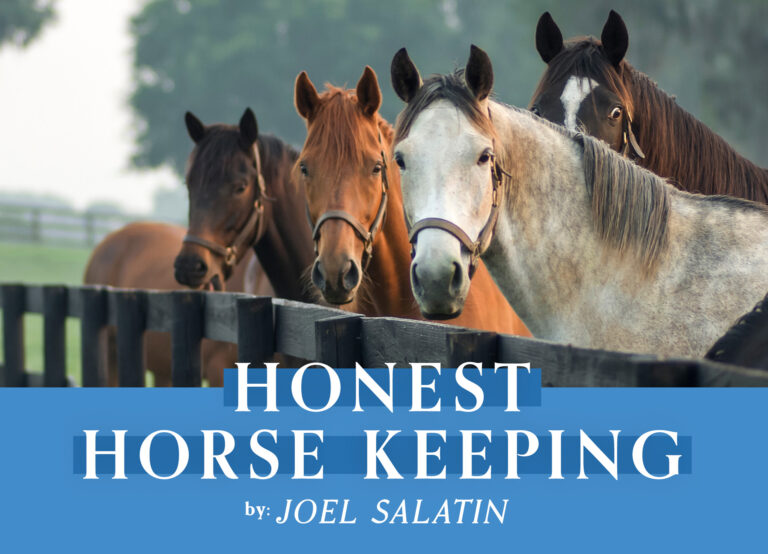by Shawn and Beth Dougherty, Plain Values
A child comes in the back door with a full milk can; the screen door slaps shut behind him. There is the sound of a bucket being set on the bench, the clang of a bail handle against the side of the milk can. In the kitchen someone is frying bacon; the smell reaches into the basement, where at a simple counter and sink we process raw milk twice daily.
Sometimes we wonder how we got here! When we first thought we might keep a dairy cow, we worried that the chores would be too much work and that we would not be able to maintain a rigid schedule. Not only were we taking on twice-daily milking, but we would be moving our intensively grazed dairy cows onto fresh grass each time we milked. With all the other farm chores and homeschooling our eight children, were we going to have time for the added work? But while milking a cow does require commitment, it turned out to be not nearly as much work as we expected.
CHORE TIME
Take the schedule, for instance. We had read that we had to milk at exactly the same time every day, not deviating by so much as a quarter of an hour. We had heard that cows that weren’t milked on a tight schedule give less milk and were prone to mastitis—an infection that may come when the udder gets too full.
But we quickly realized that we didn’t care whether Isabel was producing the maximum amount of milk. The two to five gallons of milk she gave us daily were already far more than we were used to drinking. So a little less milk was fine with us! Anyway, since we weren’t feeding her grain, she wasn’t producing so much milk that her udder was overfull, even if we milked a little late—so she wouldn’t be prone to mastitis. So with that worry off our minds, we settled into the chore of regular milking.
And it is a regular chore, for sure! We were milking at five in the morning and four in the afternoon. Fortunately, since we homeschooled and homesteaded, being at home wasn’t really a problem for us. In fact, the consistency added a new level of order to our day. With at least one person always up to do the milking, we found that all of us were apt to rise a bit earlier. And because now everyone was awake, we all got to the breakfast table in time to say grace, so our day started in better order.

Still, when we planned an event or stayed up late at night, we sometimes wished that we could occasionally miss a milking. Wouldn’t it be nice if we had a part-time milker who would step in when we really wanted a break? Well, it turned out that our part-time farm help was right under our noses! Little had we suspected that every dairy cow comes with her own personal milker, an expert who works free of charge, and is a champion at his job.
FREE FARM HELP
When Isabel came to live with us, we didn’t know anything about keeping dairy cows, so we ordered some books and extension office bulletins on dairying. These resources instructed us that when our cow calved, we should take her calf away immediately and bottle-feed it calf formula. It should not be allowed to nurse: if it did, it would get sick, plus, there would be less milk for the humans.
We’d already discovered that ‘less milk’ could still be a whole lot, so we were okay with that part. We began wondering why drinking their mother’s milk was going to make our calves sick. It didn’t make sense to us; didn’t God make cows’ milk specifically for feeding baby cows? Some books warned that a nursed calf would overeat and get sick that way. But when we tried letting calves nurse on their mothers, we only saw good results. In fact, they were so good that we’ve never taken a calf from its mother since!
Mama-raised calves are so much healthier and more energetic than bottle-fed calves—we were astounded. The difference wasn’t the food, because we’d always fed real milk, not formula; so the principle difference had to be the mothering itself. And why not? God made mama cows to raise baby cows, so it stands to reason they’d be good at it. The calves nursed all they wanted to, and none of them got sick, either. Meanwhile, we went on milking as usual.
As the calves grew, we got less milk in the bucket, of course; so after a while, we started shutting them away from their mothers at night. When we milked in the morning we got all the milk made overnight, while the babies had enjoyed a cozy bed in the barn. All day they nursed as they pleased, and went to bed with full tummies; in the morning, we milked again.
It was a great system! No surprise, really—taking our pattern from God’s good Creation always works out best.
It was a great system! No surprise, really—taking our pattern from God’s good Creation always works out best. Now we could milk once a day and still get all the milk we wanted. We even found we could be away overnight and no harm done: when allowed to stay with their mothers round the clock, the calves eagerly made up for our dropped chores and took the extra milk without problems. So we had the best possible farm hands, dedicated professionals—and they didn’t charge a thing.
GREEN GRASS
There was still the time it took to build paddocks and move our cows to new grass twice a day. This ‘rotational’ grazing is part of how we use our cows to improve pastures and eliminate the need to buy feed, hay, or dewormer. Moving them twice a day means our cows always have fresh grass to eat.
But we weren’t sure we wanted to set up fences at five o’clock in the morning! We learned to solve that problem by setting up an extra-large paddock every night and dividing it in half with a ‘cross fence.’ This single piece of twine takes only a minute to reel back in the morning, letting the cows move up onto fresh grass.
Actually, moving fence every day saves us more time than it takes. Really! First, cows on pasture don’t need to have grass brought to them, and the farmer never has to haul manure, either. Next, cows that are moved to fresh grass regularly are not prone to parasites, saving us the time, trouble, and cost of deworming them. And because our cows are entirely grass-fed, we don’t have to buy, transport, or dole out grain feed—nor earn the money to buy it. It turns out that our dairy cow creates more order, not less, in our lives.
HOME SWEET PASTURE
We’re glad we decided all those years ago to become family cow owners. We love having all the milk we could possibly want, and using the patterns of nature to grow our food reminds us daily how beautifully God provides for His Creation.
This article was published in the April 2023 issue of Plain Values Magazine. If you want the latest Q&A’s every month (including two panelist answers), subscribe to the magazine HERE. As a special thanks, get 10% off your subscription with the code “GAB23”!

Shawn and Beth Dougherty live in eastern Ohio, where their home farm is 17-acres designated by the state as “not suitable for agriculture.” Using grass as the primary source of energy, they raise dairy and beef cows, sheep, farm-fed hogs, and a variety of poultry, producing most of their food, and feed, on the farm. They are also the authors of The Independent Farmstead, published by Chelsea Green.





